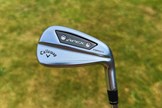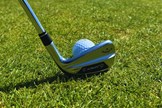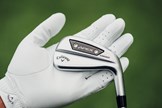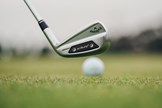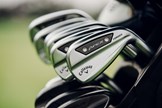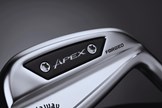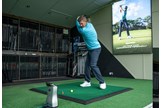Could these be the most complete player’s distance irons for pure feel and power? Callaway Apex Ai200 Irons Review
Last updated:
-
At a glance
- TG Rating
- Owner Rating
-
Pros
- Super soft feel
- Sleek design
- Light shafts -
Cons
- Slightly high price point
What we say...
I’ve been playing with the new Callaway Apex Ai200 irons, and they’re definitely some of the best golf irons I’ve ever hit.
Callaway are known for making some of the best golf irons, and that reputation continues with their latest releases. When they revealed the Ai200 and Ai300 irons, they felt both brand new and very familiar at the same time. Callaway have taken the Apex design that was first introduced in 2014 and constantly developed it throughout the last ten years to bring us their most recent model.
Callaway have designed their new Apex Ai200 irons for pure feel, power, and consistency. The elegant hollow-body mixes performance and precision in what the brand say is their most complete player’s distance iron, delivering optimum results for the better golfer.
A forged hollow-body combined with a forged 455 face creates a Tour-level sound and feel. This advanced forged construction is combined with a stunning, premium design that will look great in any golf bag. In addition to enhanced feel, Callaway say that the Forged 455 Face Cup also delivers outstanding power across the face. This unique combination of power and feel ensures the Apex Ai200 will become some the best golf irons available.
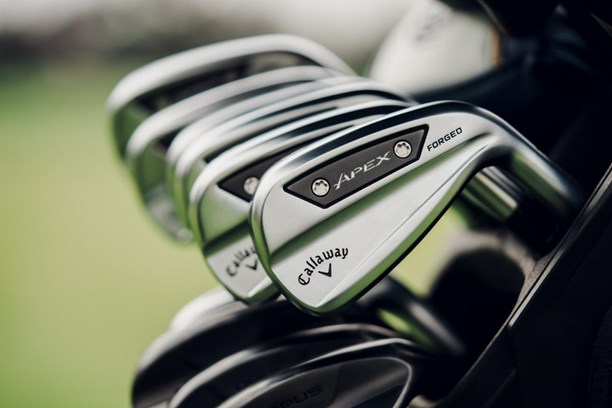
The Apex Ai200 is said to achieve incredible consistency through the Ai Smart Face. Using real golfer swing data combined with artificial intelligence, Callaway’s Ai Smart Face generates outstanding speed and spin consistency without compromising dispersion.
Strategically positioned MIM weighting (metal-injection moulding, a process that results in very dense, precise weights) ensures the optimal Center of Gravity for the best launch windows. The Dynamic Sole Design ensures enhanced turf interaction to provide more forgiveness through impact with the ground.
An elegant, forged hollow-body iron that mixes performance and precision
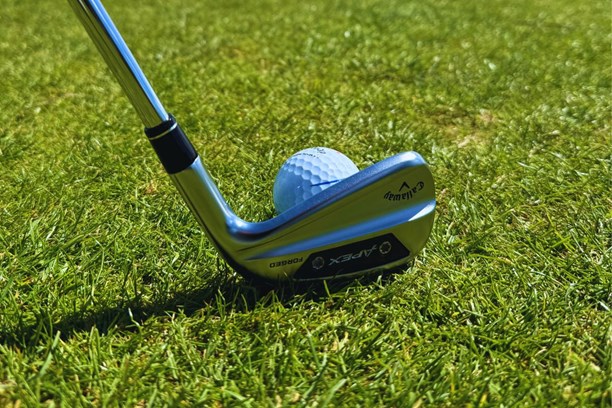

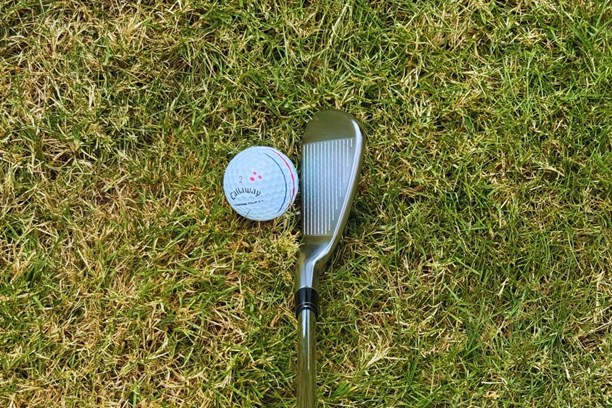
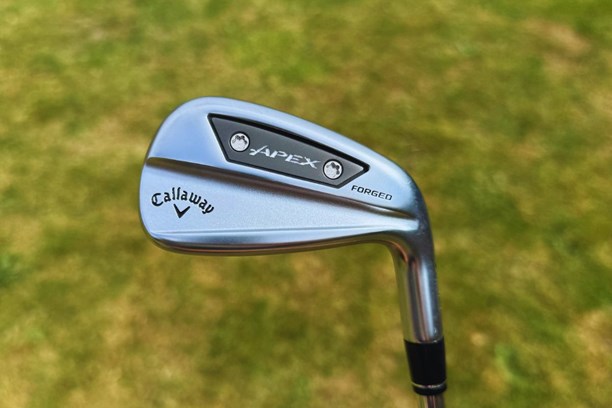
Pros
- Super soft feel off the clubface
- Great turf interaction
- Stunning sleek design
Cons
- High price point
Initial thoughts
Callaway’s Apex Ai200 iron incorporates modern AI technology within the club face, but the iron retains design features that we’ve seen across all of the Apex models over the last ten years.
As soon as I picked up the Callaway Apex Ai200 irons, it was clear that the design has been aimed at the better player. They feature a smaller club head than I’m used to, and a very thin top line. They did look a little on the small side for me, but that’s only due to my current set being one of the best game improvement irons on the market.
I felt like I was looking at an already tried and tested golf club, and was very excited to see what they were capable of both on the driving range with TopTracer data, and out on the golf course.

Look and Feel
The design of the Apex Ai200’s looked incredibly sleek, and even just from feeling the club head I knew how soft the irons were going to feel on contact with the ball, thanks to the forged 455 face. The Apex Ai200’s were a little shorter than the Apex Ai300’s, another example of how they’ve been aimed at the better player.
After hitting a few shots with the Apex Ai200 irons, my first thought was how solid, yet soft, they felt. Even on the odd mis-hit, there was no painful feedback from the stiff Dynamic Gold S300 steel shaft, those shots seemed to feel just as soft as the ones I’d made solid contact with.
The irons didn’t feel too heavy in-hand, which was a pleasant surprise. I expected the club-head to feel heavy at the bottom of the stiff Dynamic Gold shaft, but they were surprisingly light and I felt I could really gauge where the club head was in my downswing.

Performance
The Ai200s performed incredibly well for me. Every shot had a great high ball-flight, which is what Callaway are promising with their strategically placed MIM weights, and my Top Tracer data was showing the 7-iron was consistently reaching 160yards, which is around 10-yards longer than I would usually hit with my current set of irons. Callaway’s data shows Ai200 to be on average 6yards longer than the 2021 Apex irons.
Out on the course, the impressive distance was evident as I was regularly having to take one-club less than usual. Hitting higher lofted irons into par-3’s was especially confidence-boosting; when Callaway say the Apex Ai200 are designed to spin more and carry further, they’re not lying. They claim their Paradym irons didn’t spin enough, the more recent Ai Smoke irons were an improvement, but now Apex Ai200 sets the bar for them in terms of irons optimised for launch, spin and ball speed.
I also achieved fantastic turf interaction with these irons, taking some really nice divots, the mark of a great strike.
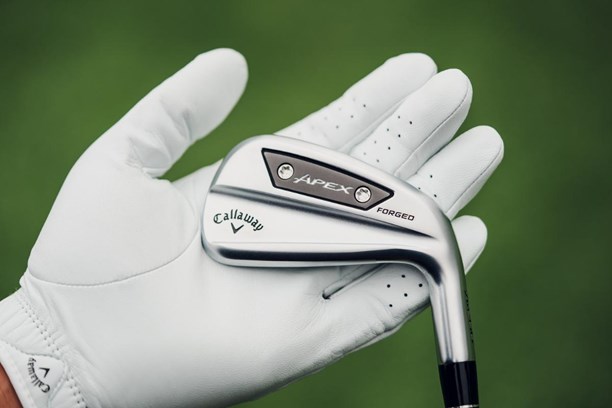
Forgiveness
I can honestly say that 99% of the shots I hit with the Apex Ai200 were on target. My dispersion was much tighter than usual, and this was consistent throughout the iron set. Aside from a few pulled shots out on the course, my iron play has been pretty uniform in terms of distance and accuracy since I’ve had these irons in my golf bag.
Shots that I hit a little thin still had a higher ball flight than I would have expected, and the feel off the clubface is consistently soft regardless of if the ball comes a little out of the toe or the heel. Off-center shots still had a good amount of hang-time on them, with a nice shape to the ball-flight, and they definitely seemed less off-target than the same type of shot with my current set of irons.
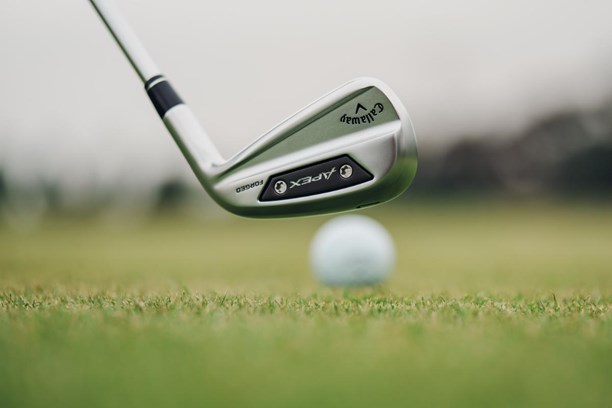
Final Verdict
As a 4-handicapper, who doesn’t have the fastest swing speed, I honestly thought out of the new Callaway releases, the Ai300’s would perform better for me. To see a more consistent high launch and better distance with the player’s Ai200’s was a surprise.
I absolutely loved the consistent soft feel of these irons, and they really made me feel like the club was doing a lot of the work in striking the ball. I didn’t have to hit them hard, just a nice slow tempo with my swing was enough to get my golf ball flying better than it has in years.
After a set of irons I started playing with two years ago had a hand in cutting my handicap index from 10 to 5, I wonder how much lower I can get with the Callaway Apex Ai200’s, as they’re definitely going in my bag!
In the hands of our test pro
As part of our Best Callaway Iron test sessions we also put the Apex AI200 in the hands of TG Test Pro Neil Wain. Below is a data chart to show how the model faired against the rest of the Callaway iron family and a selection of competitor models.
Callaway may have invented the Players Distance Iron category but they’ve never really had a hollow body, fast face model to rival the brilliant TaylorMade P790 which until now has utterly bossed the market. From what I saw during our test pro session the Apex Ai200 will give the P790, Titleist T200 and PXG 0311 GEN7 P a real run for their money in 2024 and beyond.
You shouldn’t really be choosing between the Ai200 (a players’ distance iron) and the more game improver Callaway Ai Smoke but if you find yourself doing so our data shows the 2° loft difference (7-iron) is likely to translate to over 2.5mph more ball speed and six extra yards of carry distance in favor of the Ai Smoke at reasonable speeds. The slightly weaker lofted Apex Ai300 (1° more 7-iron loft than the AI Smoke) sits between the pair with the performance difference dropping to 1.2mph of ball speed and 4 yards of carry distance.
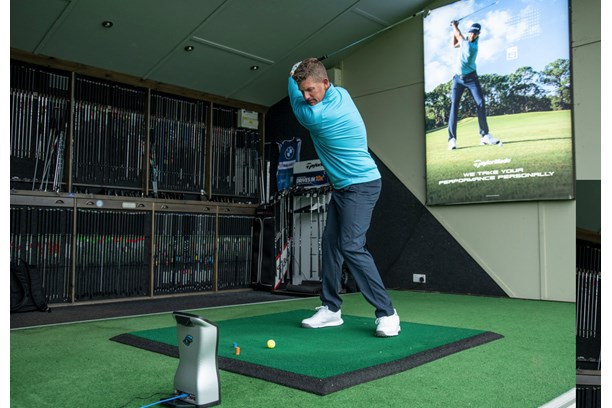
Don’t let speed and distance entirely cloud your judgment though. The Ai200 creates more spin and stopping power (a steeper descent angle) than the other two which reasonable club golfers will really appreciate as together they add an extra degree of predictability to approach play and scoring.
Shot area and dispersion change from session to session, they’re a reflection of how our test pro performs with each club (much more so than highlighting the forgiveness of models), interestingly though the Ai200 produced a very similar dispersion area to the more forgiving AI Smoke and AI Smoke HL models. Hopefully, that’s food for thought for golfers who question the consistency of fast-face hollow body options vs solid body models, and anyone swaying towards the Apex CB and Apex Pro which are aimed squarely at decent players’.
Data comparison: How the Apex AI200 compare in data to the rest of the Callaway iron family (Test pro data)
| 7-Iron Loft | Ball Speed | Launch Angle | Backspin | Peak Height | Descent Angle | Carry Distance | Shot Area | |
| Callaway Apex 24 MB | 34° | 116.5 MPH | 16° | 6293 RPM | 28 YDS | 44.4° | 163 YDS | 254.4 SQ YDS |
| Callaway Apex 24 CB | 34° | 121.4 MPH | 15.1° | 6465 RPM | 29 YDS | 45° | 170 YDS | 265.2 SQ YDS |
| Callaway Apex 24 Pro | 33° | 124.6 MPH | 14.5° | 6598 RPM | 30 YDS | 45.4° | 175 YDS | 387 SQ YDS |
| Callaway Apex AI200 | 30° | 126.7 MPH | 13.9° | 5775 RPM | 30 YDS | 44.3° | 182 YDS | 157.3 SQ YDS |
| Callaway Apex Ti Fusion | 30.5° | 127.8 MPH | 13.2° | 6078 RPM | 29 YDS | 44.1° | 182 YDS | 178 SQ YDS |
| Callaway Apex AI300 | 29° | 127.9 MPH | 14° | 5343 RPM | 30 YDS | 44° | 186 YDS | 233.8 SQ YDS |
| Callaway Paradym AI Smoke | 28° | 128.1 MPH | 13.9° | 5000 RPM | 30 YDS | 43.5° | 188 YDS | 125.1 SQ YDS |
| Callaway Paradym AI Smoke HL | 30° | 126.4 MPH | 14.8° | 5452 RPM | 32 YDS | 45.2° | 181 YDS | 103.8 SQ YDS |
Also Consider
If you’re a better player wanting minimal offset in your irons, combined with high launch and spin, then the Apex Ai200’s would be ideal for you. If you’re a regular golfer with a slightly higher handicap wanting to enjoy the game with higher ball-flights and the ability to stop the ball on the greens more often, then the Ai300’s would be a great alternative.
About the author

Sarah Pyett – Deputy Digital Editor
Sarah Pyett is the Deputy Digital Editor of todays-golfer.com. She plays off a handicap of 4, and specializes in ladies’ equipment reviews, including drivers, irons, and golf balls.
After a career in a golf professional shop, and earning a qualification in golf club management, Sarah joined Bauer in 2014 as a Web Producer for Today’s Golfer. She has since worked across multiple brands in a mixture of digital marketing and paid media roles, before returning to focus on golf full-time as Deputy Digital Editor in 2024.








